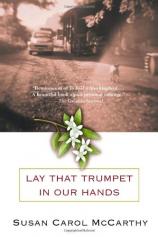Lay That Trumpet in Our Hands
Review
Lay That Trumpet in Our Hands
Susan Carol McCarthy's noteworthy debut spins a story of racism and redemption in Central Florida. Set in the 1950s and based on true events, LAY THAT TRUMPET IN OUR HANDS explores a darker --- and very real --- side to Florida's tourist-clogged beaches and pink flamingo-hued decadence.
Perspicacious Reesa McMahon narrates the story as she comes of age amid fragrant rows of citrus trees and whitewashed clapboard houses in the fictional town of Mayflower. As transplanted Yankees, Reesa's family is only halfheartedly accepted into a white community steeped in Southern culture and Baptist fervor. Life is a paragon of childish innocence for the protagonist until family friend Marvin Cully, an African-American citrus picker, is viciously beaten and murdered by the Ku Klux Klan. As the story unfolds, Reesa must reconcile her neighbors' generosity and Southern charm with their bigotry and violence.
The local police, a stronghold of Klan members, glosses over the brutal crime. Fearing no repercussions, the Ku Klux Klan embarks on a campaign of terror, blowing up African-American housing projects, Jewish community centers, and Catholic churches across the state. In Mayflower, the only white family besides the McMahons to socialize with the black community are run out of town amid death threats and vandalism to their grocery store. The Klan even go so far as to boldly attempt a kidnapping of NAACP attorney Thurgood Marshall in broad daylight. Finally, a double murder gets the attention of the FBI, who arrives in Mayflower to investigate. Reesa's father is among the few who dare to help the federal agents, putting the family into peril. The dramatic finale recounts true events that brought about a measure of justice and decimated the Klan's iron rule over Central Florida.
Although the story treads overly familiar territory and frequently lapses into cliche, McCarthy is an adept storyteller. The simple, straightforward language befits an extremely perceptive 12-year-old whose experiences and observations are at times sharply insightful, heartbreaking and humorous, and the narrative's flow is seamless. The title is culled from an old Southern hymn, and McCarthy's prose lavishly evokes Florida's rural and distinctly Southern roots as an agricultural hub. Despite her richly detailed portrait of life in the racist South, most characters favor extremes --- coming across as exceedingly heroic or unrepentantly evil --- and end up feeling like caricatures. It seems that comparisons to Harper Lee's TO KILL A MOCKINGBIRD are inevitable, although LAY THAT TRUMPET IN OUR HANDS doesn't have the depth nor the sophisticated plot structure of Lee's classic novel. However, it does give voice to the individuals whose "time in the fire was Florida in the early '50s."
The sincerity of Reesa's tale and straightforward manner of dealing with complex issues may appeal more to a young adult audience, but McCarthy's engaging story is appropriate for all who wish to reexamine this dark chapter in American history.
Reviewed by Jen Robbins on January 24, 2011
Lay That Trumpet in Our Hands
- Publication Date: April 1, 2003
- Genres: Fiction
- Paperback: 288 pages
- Publisher: Bantam
- ISBN-10: 0553381032
- ISBN-13: 9780553381030




